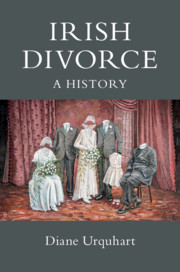Book contents
- Irish Divorce
- Irish Divorce
- Copyright page
- Dedication
- Contents
- Figures
- Acknowledgements
- Introduction: The ‘Anatomy of a Divorce’
- 1 Divorce in Two Legislatures: Irish Divorce, 1701–1857
- 2 The Failings of the Law: The Cases of Talbot and Westmeath
- 3 A Non-Inclusive Reform: Ireland and the Divorce and Matrimonial Causes Act of 1857
- 4 Divorce in the Post-Reform Era of 1857–1922: ‘Like Diamonds, Gambling, and Picture-Fancying, a Luxury of the Rich’
- 5 The Widening Definition of Marital Cruelty
- 6 Divorce in Court, 1857–1922
- 7 ‘An Exotic in Very Ungenial Soil’: Divorce in the Northern Ireland Parliament, 1921–1939
- 8 With as ‘Little Provocation as Possible’: The Northern Ireland Move to Court
- 9 An ‘Unhappy Affair’: Divorce in Independent Ireland, 1922–1950
- 10 Marriage Law ‘in This Country Is an Absolute Shambles’: The Reform Agenda
- 11 A ‘Curiosity [and] … an Oddity’: Referenda in 1986 and 1995
- 12 The ‘Last Stretch of a Long Road’: The Family (Divorce) Law Act of 1996
- Conclusion
- Bibliography
- Index
1 - Divorce in Two Legislatures: Irish Divorce, 1701–1857
Published online by Cambridge University Press: 16 January 2020
- Irish Divorce
- Irish Divorce
- Copyright page
- Dedication
- Contents
- Figures
- Acknowledgements
- Introduction: The ‘Anatomy of a Divorce’
- 1 Divorce in Two Legislatures: Irish Divorce, 1701–1857
- 2 The Failings of the Law: The Cases of Talbot and Westmeath
- 3 A Non-Inclusive Reform: Ireland and the Divorce and Matrimonial Causes Act of 1857
- 4 Divorce in the Post-Reform Era of 1857–1922: ‘Like Diamonds, Gambling, and Picture-Fancying, a Luxury of the Rich’
- 5 The Widening Definition of Marital Cruelty
- 6 Divorce in Court, 1857–1922
- 7 ‘An Exotic in Very Ungenial Soil’: Divorce in the Northern Ireland Parliament, 1921–1939
- 8 With as ‘Little Provocation as Possible’: The Northern Ireland Move to Court
- 9 An ‘Unhappy Affair’: Divorce in Independent Ireland, 1922–1950
- 10 Marriage Law ‘in This Country Is an Absolute Shambles’: The Reform Agenda
- 11 A ‘Curiosity [and] … an Oddity’: Referenda in 1986 and 1995
- 12 The ‘Last Stretch of a Long Road’: The Family (Divorce) Law Act of 1996
- Conclusion
- Bibliography
- Index
Summary
This chapter explores Irish bills for divorce brought to Westminster from 1701 and to the Irish parliament until the Act of Union in 1800. The moral, reputational and financial impact of divorce is considered from a gendered and class-based perspective and noteworthy cases such as that of Sir John Dillon and Lord Abercorn are examined. The profile of the first Irish divorcees in terms of gender, religion, class and grounds for divorce is determined. Moreover, themes of female agency, illegitimacy, collusion, adultery, false testimony (procured in particular from servants) as well as the association between the availability of divorce as an incentive to adultery which became a recurring theme in both clerical and lay debates are also explored in both jurisdictions. The impact of the Act of Union on the rate and profile of Irish divorces is analysed. In addition, the popular criticism and press reportage of Irish divorce allow the tropes of immorality and moral superiority to be defined and considered.
Keywords
- Type
- Chapter
- Information
- Irish DivorceA History, pp. 23 - 43Publisher: Cambridge University PressPrint publication year: 2020



